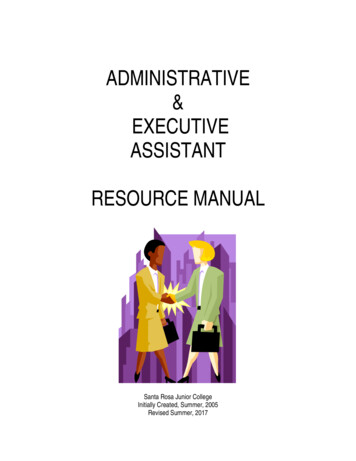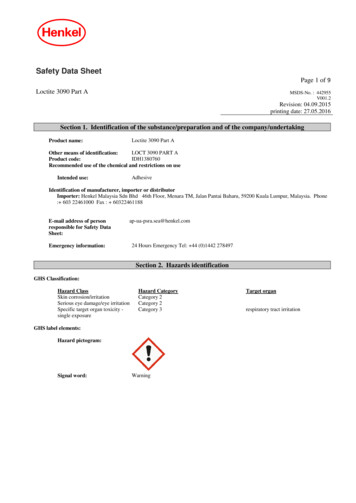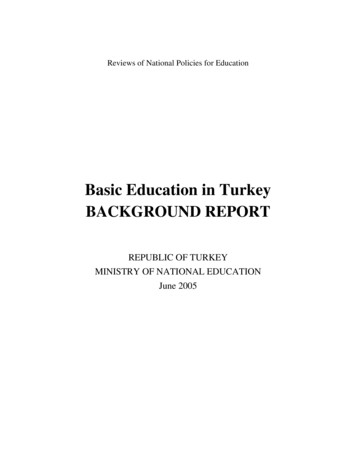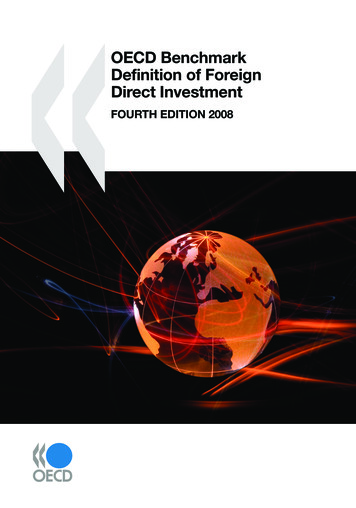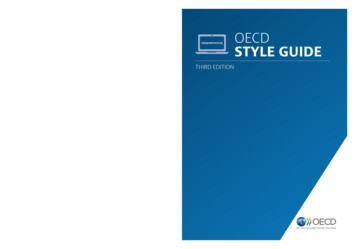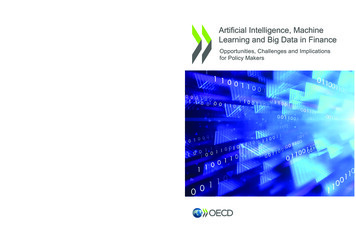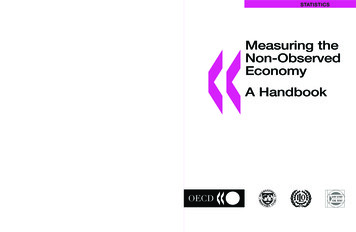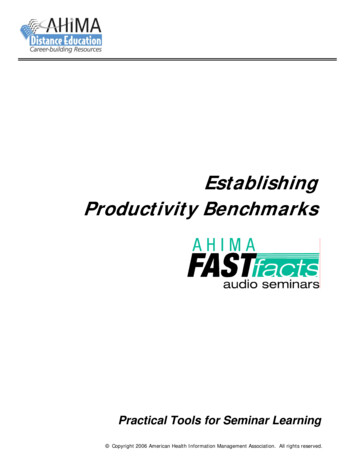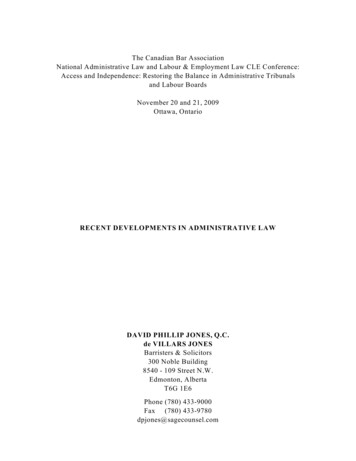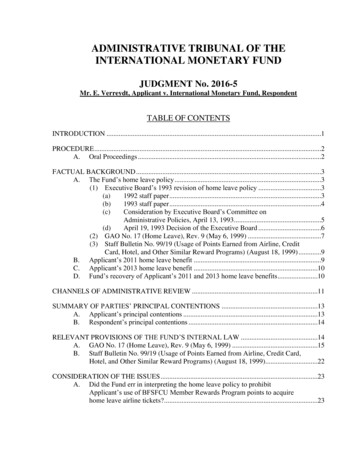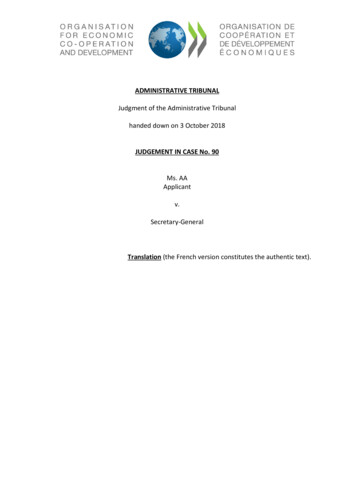
Transcription
ADMINISTRATIVE TRIBUNALJudgment of the Administrative Tribunalhanded down on 3 October 2018JUDGEMENT IN CASE No. 90Ms. AAApplicantv.Secretary-GeneralTranslation (the French version constitutes the authentic text).
JUDGMENT IN CASE No. 90 OF THE ADMINISTRATIVE TRIBUNALSitting on 17 September 2018At 10 a.m. in Château de la Muette,2 rue André-Pascal in ParisThe Administrative Tribunal consisted of :Mrs. Louise OTIS, ChairMr. Luigi CONDORELLIAnd Mr. Pierre-François RACINEwith Mr. Nicolas FERRE and Mr. David DRYSDALE providing Registry services.The Tribunal heard:Mr. Giovanni M. PALMIERI, counsel of the Applicant ;Mr. Rémi CEBE, Head of General Affairs Division of the Organisation’s Directorate for LegalAffairs, on behalf of the Secretary-General; He was assisted by Mr. Auguste NGANGAMALONGA, acting Head of the Staff Matters, Privileges and Immunities Coordination Unit of theOrganisation’s Directorate for Legal Affairs2
INTRODUCTION[1]In her application for annulment and compensation registered with the Registryon 19 December 2017, the applicant, AA, seeks the annulment of the decision of theSecretary-General of the Organisation for Economic Cooperation and Development (the‘Organisation’) of 14 November 2017 dismissing her request for the withdrawal of adecision of 11 August 2017 refusing her full coverage of live-in care expenses. Theapplicant also seeks the reimbursement of the sums due for private nursing services,namely 65,422.13 euros. Moreover, she claims moral damages on the grounds of abreach of the Organisation's duty of care to her, while leaving it to the Tribunal todetermine the amount. Finally, the applicant seeks reimbursement of the costs ofproceedings in the amount of 10,000 euros.[2]The Secretary-General of the Organisation submitted his comments on 19[3]The applicant submitted a reply on 3 April 2018.February 2018.[4]The Secretary-General of the Organisation submitted his comments in rejoinder[5]The parties were authorised to submit documentary evidence and the applicanton 4 May 2018.submitted a short video to demonstrate her incapacity. 1The facts in the contentious situation[6]The applicant, who was born in 1960 and is of Spanish nationality, took up her[7]On 23 August 1989, four (4) months after taking up her duties, she was involvedduties at the Organisation on 3 April 1989 as a grade A2 Administrator at theInternational Energy Agency.in a serious traffic accident in which her mother died and her sister was seriously injured.1The exhibits submitted by the applicant are identified under reference R and those submitted by the SecretaryGeneral under reference O.3
The applicant herself suffered a serious head injury with irreversible damage of all kindsthat resulted in total permanent incapacity under the law of her country of origin.[8]Since the accident in 1989, the applicant's state of health has required substantialmedical care, which is covered by the Organisation through its own medical insurancesystem ‘OMESYS’; this is managed by a service provider – initially GMC, today Henner.The cost of this care is paid for in full by the insurer, as the applicant has beenrecognised as disabled under Spanish law.[9]The evidence provided by the parties shows that since 1989, the applicant’s[10]This daily care is provided by non-qualified live-in carers specialising in the[11]Moreover, the incapacity was recognised by the Organisation, which has paidcondition has also required life support care to compensate for her loss of autonomy.provision of daily care to patients suffering from complex neurological disorders. Theselatter are not medical nurses.her a disability pension since 1 November 1990, the date on which she was placed onpermanent non-active status. As of 1 January 2018, the amount of this pension was4,187 euros per month.[12]Since 1991, the manager of Omesys has reimbursed the applicant from year to[13]Thus, on 10 March 2009, GMC wrote a letter to the applicant headed ‘Medicalyear for the live-in care expenses incurred within the limits of the applicable ceilings (in2016, 168 euros per day).decision on a request for prior agreement’ to inform her that the medical officer hadissued a favourable opinion on the reimbursement of live-in care expenses within thelimit of a ceiling of 168 euros per day beyond 8 hours per day. This letter states:‘Duration of this agreement: Six months from the date of the medical officer’s opinion,subject to your entitlement to benefits on the date on which the care is actuallyprovided.’ 22Exhibit R-7 of the application.4
[14]In 2014, the Organisation asked the manager of Omesys to review the situation[15]In this context, the manager of Omesys, Henner, sent the applicant and herof former staff members who benefited from the reimbursement of live-in care expensesunder the statutory rules.father, who is her legal guardian, a letter dated 15 February 2016 stating thatdependency expenses were not covered by the contract between the Organisation andthe manager of Omesys, and that the past coverage of live-in care expenses arose from‘a misinterpretation by [our] services of the Omesys contract’. 3[16]Without claiming the repayment of ‘the amounts incorrectly paid’, the managerinformed the applicant that the coverage of live-in care costs would be limited, after aperiod of six months, to two hours per day from 15 August 2016, to give her a chanceto make alternative arrangements.[17]This decision was immediately contested by the applicant’s guardian, her father.4[18]The Organisation, which was informed of the situation, initiated discussions to[19]At first, on 19 January 2017, it was arranged that each party would appoint asettle the dispute, but no agreement has been reached so far. There were twonegotiation sessions.doctor to determine the applicant’s needs, in particular for a live-in carer, and that theapplicant would withdraw from the civil proceedings instituted before the Tribunal deGrande Instance in Nanterre, which was initiated.[20]A medical board of designated doctors, thus, examined the applicant. However,the two doctors, Dr TR for the applicant and Dr J for Henner, the manager of Omesys,were unable to reach agreement on Omesys assuming the live-in care expenses,although Henner’s doctor did acknowledge that the applicant's condition required apermanent presence at her side. 5 The joint report specified the need for someone to bewith the applicant 24 hours a day, in particular during meals, when moving around, for3Exhibit R-8 of the application.Exhibit R-10 of the application.5Exhibit R-9 of the application.45
hygiene care and support with general activities. However, consensus could not bereached on the provision of all such care by a live-in carer.[21]The Organisation therefore eventually suggested to the applicant's counsel thatdiscussions should be initiated with a view to an exceptional proposal for the assumptionof financial responsibility, subject to a confidentiality undertaking signed by the parties.This commitment stipulated that confidentiality must be respected, even before theAdministrative Tribunal, in the event that the discussions broke down.[22]During a meeting on 10 July 2017, the Organisation then proposed, on anexceptional basis, that the applicant's live-in care expenses should be covered not for2 hours per day, but for 14 hours per day, 7 days a week, thus leaving 10 hours to becovered by the applicant. 6 The applicant’s guardian declined this proposal.[23]This negotiation session was held under a confidentiality agreement. However,as the proposal now constitutes a formal offer recorded in these proceedings, it ispermissible to refer to it on this basis alone; the discussions that took place between theparties remain fully protected by the confidentiality agreement.Disputed matters[24]As a first step, the Tribunal will have to decide on the admissibility of theapplication, since the Organisation claims that it is not directed against the SecretaryGeneral’s final decision and was filed outside the time limits set by the CouncilResolution on the status and functioning of the Administrative Tribunal.[25]Then, on the substance of the case, the Tribunal will have to determine whetherthe contested decision was taken in breach of the rules of the Staff Regulations, Rulesand Instructions Applicable to Officials of the Organisation (the ‘Staff Regulations’) andabove all of the social protection scheme. In addition, it will be necessary to decidewhether there has been a clear breach of the duty of care and the principle of soundadministration to which the Organisation is subject.6Secretary-General’s comments, paragraphs 73 and 76; Rejoinder, paragraphs 59 and 60.6
AnalysisFormal points[26]The Organisation argues that the Secretary-General’s final decision was thedecision of 11 August 2017 7, received on 17 August 2017. Consequently, the three-month period provided for in Article 4a) of Annex III of the Staff Regulations set adeadline of 17 November 2017 for the submission of the application. As it was submittedon 14 December 2017, the Tribunal should declare the application inadmissiblebecause it was filed late.[27]Article 3 ‘Written request prior to the filing of applications’ of Annex III to the StaffRegulations states that:‘Subject to the provisions of Article 4 b) below, applications to the AdministrativeTribunal shall not be admissible unless the applicant has given the SecretaryGeneral a prior written request for withdrawal or modification of the contesteddecision, and the Secretary-General has rejected such request or has not repliedwithin a period of one month. Such prior request shall be given to the SecretaryGeneral within two months from the date of notification of the contested decision inthe case of members of staff, the Staff Association or trade unions or professionalorganisations, or within four months from the date of such notification in the case offormer members of staff or duly qualified claimants to the rights of members of staffor former members of staff.’[28]Article 4 a) of Annex III to the Staff Regulations reads as follows:‘Applications shall be filed with the Registry of the Tribunal within three months fromthe date of notification of the rejection by the Secretary-General of the prior requestor from the date of the implied refusal of such request. However, in exceptionalcases, the Administrative Tribunal may admit applications filed after such time limithas expired.’[29]The letter of 15 February 2016 which communicates the decision of the manager[30]The applicant’s guardian could not have known that this decision should haveof Omesys does not come from the Secretary-General, does not mention that thedecision was taken under his delegation and does not copy him in to the decision.been considered as a decision of the Secretary-General, and the absence in the letter7Exhibit R-12 of the application.7
of 15 February of any indication of the means and time-limits for appeal inevitably misledthe guardian concerning his procedural obligations if he intended to contest thedecision. The Tribunal therefore rules that this letter did not pose any time limits.[31]Second, the Organisation’s response to the receipt of the complaint of 5 April2017 shows that the parties engaged in a negotiation process that was supposed tolead to a new administrative decision. This is what in fact happened: the decision of 11August 2017 increased the Organisation’s coverage of the corresponding costs from 2to 14 hours of live-in care per day, with effect from 5 April 2017. This was theOrganisation’s decision.[32]From the date of receipt of this decision, the applicant was required to submit aprior request within the two-month period stipulated in Article 3 a) of the StaffRegulations, which she did on 29 August 2017. 8 The Secretary-General having rejectedthis request on 14 November 2017 9, the application registered at the Tribunal on 14December 2017 was filed within the three-month period provided for in the StaffRegulations. It is therefore admissible.[33]The Tribunal notes that its decision on the admissibility of the complaint is in linewith a significant and consistent body of international administrative case law. Forexample, the following was decided in Judgment 2584 of the ILO AdministrativeTribunal:‘If an organisation invites settlement discussions or, even, participates indiscussions of that kind, its duty of good faith requires that, unless it expressly statesotherwise, it is bound to treat those discussions as extending the time for the takingof any further step. That is because settlement discussions must proceed on thebasis that no further step will be necessary. Where, as here, there has been noactual decision but the Organization has invited settlement discussions, the duty ofgood faith requires it to treat the time for taking a further step as running from thetermination of those discussions and not from some earlier date identifiable as thedate of an implied negative decision. That is because the invitation necessarily89Exhibit R-13 of the application.Exhibit R-14 of the application.8
implies that, no matter what the Staff Regulations or Staff Rules provide, no finaldecision has been or will be taken during the course of discussions.’10The substance of the case.[34]Regulation 17 of the Staff Regulations provides that:‘Officials shall be entitled, in accordance with Rules of the Secretary-General,subject to approval by the Council:a) to benefits in case of sickness, maternity, work accident, invalidity or death ’[35]Instruction 117/1.6.1 a) states that:[36]Instruction 117/1.6.2 c) provides that:[37]‘In the event of sickness, maternity or accident other than those mentioned inRule 17/1.12, the beneficiaries listed in paragraph a) of Instruction 117/1.4.1shall be entitled to cover for expenses in respect of medical attention or surgeryor of treatment or prescriptions, subject to the limits and according to theprocedure laid down in Annex XIV of these Regulations. Such cover may takethe form of direct payment, in full or in part, to the supplier or provider of servicesor of reimbursement of the person affiliated. ’‘Subject to application of Article 4 of Annex XIV and the other conditions set out inArticle 11 of this annex, the rate of cover for health care expenses directly relatedto the handicap shall be 100% of the costs incurred when the beneficiary isrecognised as handicapped under the legislation of his/her country of residence oris entitled to the allowance for a handicapped child under Regulation 16 g) of theStaff Regulations.’Annex XIV, entitled ‘Cover for health care expenses under Regulation 17a)‘asserts:‘Article 1This Annex lays down arrangements and procedures for payment or reimbursementof health care expenses by the Organisation’s medical and social system inaccordance with Instructions 117/1.6.1 and 117/1.13.1. It shall apply to the officialsand beneficiaries referred to in Rules 17/1.17, 17/1.21 and 17/1.22 in accordancewith Article 10 below.ILOAT, judgment no. 2584, Mr L.A.M., 7 February 2007. See also ILOAT, judgment 509, Villegas; ILOAT,judgment 2066, Tekouk; UNAT 9-9-1955, Hilpern, 57 Rec. 1,273; CJEC 11-7-1974, Guillot.109
Cover for health care expensesArticle 2a) The health care expenses payable or reimbursable by the Organisation's medicaland social system under Rules 17/1.6 and 17/1.13 shall be those set out in thetables in Article 11 below which describe the thirteen categories of expenditurecovered and specify, where appropriate, any ceilings on reimbursement or specialconditions attached to such cover.b) Cases in which health care expenses are only payable or reimbursable subjectto prior approval are specified in the tables in Article 11.’[38]The table in Annex 11 which is relevant to this case is in Heading IV, ‘Medicalaides’. It reads as follows:‘10
[39]Note 6, to which the following sub-headings refer: ‘5/ live-in carers for less that[sic] 8 hours/day’ and ‘6/ live-in carers for 8 to 24 hours/day’, reads as follows:‘6. Prior agreement is necessary when the number of days prescribed is higher thanseven. Nursing may be provided for the first seven days without waiting for theagreement.’[40]The other table relevant to the dispute is at Heading XIV. This is worded as[41]It follows from these tables that, in the case of persons with disabilities, thefollows:provision of live-in carers falls under the last category of Heading XIV, i.e. ‘All otherservices and goods directly related to the handicap reimbursable in accordance with thepreceding tables’.[42]While it is true that there is no mention of the need for prior agreement, HeadingXIV makes it clear that the coverage of such expenses is subject to the ‘same conditionsas for non-disabled persons’.11
[43]These conditions are given in Heading IV ‘Medical aides’, which includes twocategories relating to live-in care. In particular, category 6, ‘live-in carers for 8 to 24hours/day’, expressly specifies the need for prior agreement. The note – to which thiscategory refers – states: ‘Prior agreement is necessary when the number of daysprescribed is higher than seven’, as is the case here.[44]The concept of prior agreement, as provided for in Article 2 b) of Annex XIV,[45]The Tribunal therefore considers that the coverage of live-in care expenses wasrefers to the approval given by the competent authority at the request of a person.and remains subject to the agreement of the Secretary-General. It observes, moreover,that Exhibit R-6 of the application, headed ‘Medical decision on a request for prioragreement’, which is explicitly described as ‘relating to a live-in carer’, makes it clearthat the coverage of this benefit was subject to a renewable prior agreement. This is incontrast with the coverage of the expenses relating to a long-term condition, which hasbeen undertaken ‘on a permanent basis’, as can be seen from Exhibit R-7 of theapplication. It should be noted that the two exhibits cited (R-6 and R-7) bear the samedate (10 March 2009) and the same signature.[46]It is incumbent on the Tribunal at this stage to clarify how much discretion the[47]This is not a case to which the competence of the Secretary-General is linked,Secretary-General has and what criteria should be employed.as for example when a medical board has been consulted and given its opinion. Theprior agreement in question is a matter for the informed discretion of the SecretaryGeneral, subject to the scrutiny of the Tribunal.[48]The Tribunal considers that the Secretary-General is entitled, with regard to the[49]With regard to the amount of the disability pension that the Organisation pays topayment of live-in care expenses, to take into account the disabled person's ownresources and, where appropriate, those of his or her family members.the applicant, that is 4,187 euros per month as of 1 January 2018, and the currentresources of her family, the Tribunal considers that the Secretary-General’s decision tolimit to 14 hours per day the coverage of the applicant's live-in care expenses as of 512
April 2017 is not unreasonable, and is consistent with the duty of care that theOrganisation owes to a former agent in a condition of total and permanent disability.Compensation[50]The lack of communication and follow-up between the medical insurance schememanager (Omesys) and the applicant resulted in several months of uncertainty andadministrative confusion. The applicant's guardian even had to use the services of alawyer to sue the Organisation. He brought civil proceedings before the Tribunal deGrande Instance of Nanterre, which he later withdrew.[51]It was only when the Organisation was made aware of the applicant's situationthat the negotiations were conscientiously undertaken. Legal expenses were thereforeunnecessarily incurred by the applicant in order to protect her rights. The Tribunaltherefore agrees to award a nominal sum of 1 euro in moral damages, inacknowledgement of this difficult transitional period.[52]Finally, the Court considers that the objection of inadmissibility has caused theapplicant to incur costs unrelated to her substantive claims. She should therefore beawarded a sum of 2,000 euros to reimburse her costs of proceedings.FOR THESE REASONS, THE TRIBUNAL[53]DECIDES that the applicant's application is admissible.[55]DECIDES to award 1 symbolic euro in moral damages.[54]DISMISSES the application for annulment of the Secretary-General's decision.[56]DECIDES to award 2,000 euros in legal costs.13
system ‘OMESYS’; this is managed by a s ervice provider – initially GMC, today Henner. The cost of this care is paid for in full by the insurer, as the applicant has been recognised as disab
